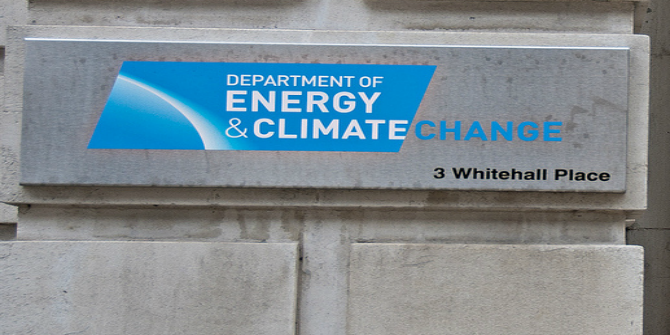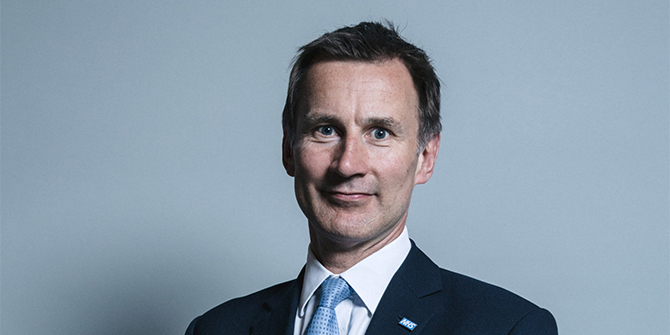 In a recent attempt to reset the political agenda as the UK comes out of lockdown, Michael Gove gave a speech focusing on Whitehall reform. Abby Innes outlines the similarities between the government’s promised strategy and (failed) attempts to transform the USSR.
In a recent attempt to reset the political agenda as the UK comes out of lockdown, Michael Gove gave a speech focusing on Whitehall reform. Abby Innes outlines the similarities between the government’s promised strategy and (failed) attempts to transform the USSR.
On the face of it, Michael Gove’s Ditchley Annual Lecture is a shrewd piece of politics. It sets out the government’s agenda for the radical reform of Whitehall in terms designed to appeal to the critical liberal centre. The guiding light is Franklin D. Roosevelt. The guiding mission is to mend the social contract identified as broken since the Global Financial Crisis. The closing statement is that Michael Gove is in politics to make ‘opportunity more equal’.
But while few liberals would oppose these ends, what matters here are the means, because any radical overhaul of the government’s machinery has the potential to make or break it. And to insist that you are in politics to end inequality of opportunity is to tell us almost nothing substantive at all: communists and economic libertarians share this goal but disagree fairly severely as to how to go about it.
Read on, however, and you discover that at the centre of this strategy is a category error of fatal proportions. The leading principle of the reform is that ‘government needs to evaluate data more rigorously’ and to do this it needs to hire more mathematicians, statisticians, data scientists and others from the physical sciences. Why? Because:
…so many policy and implementation decisions depend on understanding mathematical reasoning. That means we need to reform not just recruitment, but training. We need to ensure more policy makers and decision makers feel comfortable discussing the Monte Carlo method or Bayesian statistics, more of those in Government are equipped to read a balance sheet and discuss what constitutes an appropriate return on investment, more are conversant with the commercial practices of those from whom we procure services and can negotiate the right contracts and enforce them appropriately.
Mathematics is presented here as the discipline – the magical craft – that will optimise all these decisions and relationships and render them perfectly efficient. So why has no-one thought of this before?
The thing is they have. It was called the Union of Soviet Socialist Republics and it collapsed under the weight of its own internal contradictions in 1991. The state that historically engaged the highest proportion of engineers, mathematicians, data analysts and cyberneticians as a matter of reinventing statecraft was the USSR from 1965 to 1969: the era of the Kosygin reforms in which the Soviets tried to apply mathematics of diverse forms to solve the bureaucratic rigidity, information failures, and chronic dislocations of production and allocation endemic in the traditional method of command planning.
Like Gove and his long-time partner in this scheme, Dominic Cummings, Soviet cyberneticians would depict the governmental system as an object of technical control, with inputs, outputs, and feedback loops: the language of machines. The post-Stalinist recourse to mathematics (and extensive conversations with Western neoclassical economists and operations research specialists) gained some traction around the optimisation of production, input-output tables, and linear optimisation problems within single enterprise that sought to improve the production of simple and notably inanimate products. The Soviets also solved some logistical challenges around transport, but progress stalled every time they confronted the problems of change. They failed around any task that was characterised by uncertainty, complexity, interdependence and evolution i.e. precisely the qualities of most of the tasks uploaded to the modern democratic state.
The emphasis on comprehensive measurement in The Privilege of Public Service is positively nostalgic. Gove declares that government must prove that money is well spent, that improvements must be measurable; asks for ‘hard, testable data’ on how each policy has worked; suggests that ‘randomised control trials’ should be used for comparative quality control. Last but not least he argues that by collecting more information, data analysts will learn the ‘valuable lessons that lie buried in our data’. But he forgets that all data requires interpretation and what we choose to measure is in turn a reflection of how we interpret the world. The fabled data analyst is inescapably like Narcissus, who, confronted with a pool of data is also transfixed by their own reflection.
The government should pause at this point and imagine the scale of bureaucratic effort required to map not just the financial but the social costs and benefits of every governmental act via ‘hard, testable data’ as Gove recommends. As the Soviet economy tried to move beyond war planning to more intensive growth, the challenges of complexity and dynamism had exposed the informational limits on the existing system and more measurement had turned out to be exactly the wrong answer. The Kosygin reforms hoped to solve the crippling bureaucracy that had arisen from the all-encompassing measurement targets increasingly imposed on every Soviet enterprise to improve their efficiency. By the mid-1960s, Soviet reformers were duly advocating for greater enterprise discretion, devolution of resources, and a radical reduction in output targets. Soviet economic performance then improved, until the Prague Spring from 1967-1968 indicated that such economic reforms would beget political reform.
Why had targets proved so damaging? Because financial reward had followed the fulfilment of these ‘hard and testable’ targets, enterprise managers were rationally incentivised to manage what had quickly become contradictory if not straightforwardly impossible targets with ‘private orders of importance’, fulfilment of the easiest, cheapest measures at the expense of those that might actually be more critical and, eventually, just lying outright about outputs to survive in their posts. (See UK public sector outsourcing for current examples). This government has already missed every target it has declared so it is bemusing to hear that their solution is a strategy abandoned by the USSR as excessively bureaucratic before Dominic Cummings was born.
Even with simplified targets the Soviets were still unable to set out an efficiently centralised system of output planning because it was mathematically impossible to determine the ‘social optimum’ that would form the basis of an efficient pricing system or allow them to determine the appropriate architecture of decision-making (or in Gove’s terms ‘negotiate ‘the right’ contracts’). The reason they could not do this was fundamental: to know what was optimal and inclusive of all technological potential you would need foreknowledge – a godlike capacity to know the future of all needs and capacities before they had happened. And while Stalin – and Cummings for that matter – had insisted that ‘man’ had the capacity to discover the predetermined laws of history it turned out that these were simply what the Party said they were. This is otherwise known as totalitarianism. With such knowledge, what need for democracy?
What Soviet cyberneticians discovered is that the fantasy of ‘optimal government’ is a metaphysical space required to be both timeless and telepathic. A pure theory of optimal government may be defined as the realization of a system in which all decisions are made by the governmental units and the decisions those units take are exactly those made by a perfectly informed central authority. The Soviets even came up with a name for it: they called it ‘perfect indirect centralization‘. The ‘cycle’ of the entire governmental system must be expressed mathematically so that the disaggregated behaviour of all government agents operates as a perfect expression of what the centre would do if it were an omniscient planner, just without the central planner having to manage all the information. While it is certainly a stimulating mathematical thought-experiment it turns out to be a practical strategy for government in the way that Baron Von Munchhausen pulling himself out of the swamp by his own hair is a practical travel plan.
Soviet mathematicians discovered that optimal planning was mathematically impossible because once you introduced an iota of dynamism or complexity to the models the possibility of mathematical coherence collapsed and with it any possibility of discovering what was ‘optimal’. Further theoretical iterations, mathematical formulations or higher computing power made no difference because the problem was in the basic interpretation of the systemic reality as ‘closed’ i.e. as characterised by event regularities and predetermined laws of behaviour.
As the economist and mathematician Tony Lawson has pointed out, the use of mathematics as such brings with it a closed-system ontology of the political economy. Mathematics as a mode of reasoning rests on the use of regularities of the form ‘whenever event or state of affairs x, then event or state of affairs, y‘, and hence it necessarily involves a purely functional analysis. Closed-system thinking in turn presupposes an ontology of isolated atoms. By an atom, Lawson doesn’t mean something small, but something that, if triggered, has its own separate, independent, and invariable effect, whatever the context. If that describes you then splendid: this plan should fill you with joy.
Gove talks a lot about how important it is to have innovation and deep expertise in the system, but the fetish for mathematics as an instrument for prediction in human affairs is toxic for both. Moreover, if the fate of Cabinet Secretary Mark Sedwill is anything to go by and criticism of these proposals is regarded as heresy, then the main impact of this upheaval will be to strip the civil service of competence and what remains of its already shattered morale, another historically consistent move. The Communist Party’s tendency to purge informed criticism built avoidable ignorance into the system and contributed to its ultimate overthrow.
A closed-system ontology of government is a profound category error. As philosophers of knowledge will point out we live with inalienable sources of radical uncertainty. The first is epistemological uncertainty: the fact that there is no Archimedean point where we can stand to observe and understand the entire universe of causal mechanisms that lead us to a given situation. Second, ontological indeterminacy: the fact that every time someone has a new idea or there is emergent novelty in complex systems, the past becomes a less informative shadow of the future. This is the human condition. Examples of radical uncertainty problems that currently confront the state are the timing and magnitude of climate change tipping points and COVID-19. Thus, a theory based on past observations of regularities won’t hack it. It seems that neither Gove nor Cummings understand the distinction between calculable risk and radical uncertainty. Whatever they do after politics they should not go into insurance.
The Global Financial Crisis was a devastating proof that state agencies and corporations are inescapably run by people who operate with less than complete information: that is to say, people who live in a social as distinct from a machine world. Indeed, they are people who typically spend their working lives trying to reconcile a complex, frequently conflicting and ever-changing set of socio-economic needs and interests. Hence it simply will not wash to say of these Soviet lessons ‘but that was then, and this is now’. The Soviets tried to solve optimisation of a closed-system mathematically within almost entirely centrally planned economy under a system of totalitarian control and they failed; how much more will Cummings fail in the dynamic complex world of the democratic capitalist political economy? And how much personal data is the government going to share with unaccountable technology companies in the process?
Far from being new, these proposals are arguably the logical end point of the New Public Management reforms begun by Margaret Thatcher in 1979 and continued in barely mitigated form by New Labour. The fact is the affinities between the economic libertarianism of the last forty years and Leninism are rooted in their common dependence on a closed-system, machine model of the political economy. The neoclassical economics on which neoliberalism depends is unique in the history of economic ideas precisely for its dependence on mathematics. It is this shared dependence on a closed system theorising that explains why, when it comes to the mechanics of government, Soviet central planning and neoliberalism justify a near identical methodology of output planning, quantification, forecasting and target setting: techniques that only make sense in a closed-system, machine ‘world’.
In terms of historical parallels therefore, this means that the Conservative government has just reached the period where it despairs of the increasingly crude output planning employed since Thatcher and its rigidifying effects on administration and prays, like the Soviets in the 1960s, that mathematics will open an intellectual escape hatch out of the almighty systemic mess its doctrinaire predecessors have already induced. The Privilege of Public Service opens with a quote from Antonio Gramsci, but it is Lenin who haunts this project, opposed by Gramsci insofar as he insisted on reading Marx as a determinist. I wait with awful fascination the moment when the parliamentary Conservative Party realises it is about to squander the last vestige of its practical Burkean heritage to become a re-enactment society for the most bureaucratic regime in human history only now with more blatant financial corruption.
And we should ask this: is there anybody in this government who understands the gravity of this folly? A dependency on mathematics in policymaking and hence the necessity of closed-system thinking about government requires that the past is an exact statistical mirror of the future. But the parameters of the political economy are being changed every day by climate change. To reverse this impending catastrophe we need systems of government that place the precautionary principle and the vitality of the biosphere at their core, and we need them urgently. A plurality of approaches is certainly necessary and indeterminate modelling and the a posteriori search for patterns within data will all be valuable; but there is zero recognition of the provisional and adjunct nature of these techniques here. So which version of reality does the parliamentary Conservative Party now believe in, and does it have any conception of how much is riding on its decision? Is it really going to leave this to Dominic Cummings? An unaccountable advisor with a fixation for a discipline he doesn’t understand? God help us if the answer to that is ‘yes’.
____________________
 Abby Innes is an Assistant Professor of Political Economy in the European Institute, LSE. She is completing a book on the political economy of the neoliberal state and its affinities with Soviet central planning. Her article on ‘The limits of liberal convergence: why public sector outsourcing is less efficient than Soviet enterprise planning’ will be published shortly by the Review for International Political Economy.
Abby Innes is an Assistant Professor of Political Economy in the European Institute, LSE. She is completing a book on the political economy of the neoliberal state and its affinities with Soviet central planning. Her article on ‘The limits of liberal convergence: why public sector outsourcing is less efficient than Soviet enterprise planning’ will be published shortly by the Review for International Political Economy.
All articles posted on this blog give the views of the author(s), and not the position of LSE British Politics and Policy, nor of the London School of Economics and Political Science. Featured image credit: by Irina Grotkjaer on Unsplash.








Also, the Tories are massively winging it! They really aren’t as smart you make them out to be (and that’s saying something, because you basically liken them to the Soviet politburo circa 1967!).
Very interesting. I agree with essentially all of what you say. I’ve worked in Performance teams in local government for nearly 10 years and so know how data is used in a flawed manner to satisfy an hierarchical management set-up. I also know how most of the data quality is poor (the fog of war, I call it) and that most of management don’t really know how to creatively interpret that data.
One could argue that the reliance on a closed mathmatical data-centric model is an extension of, flawed, male thinking (and, in the case of Thatcher, a woman beholden to the self-same flawed male model). It strikes me as classic example of over thinking for the sake of it.
I wonder what a female led model would look like? Personally, I believe that an adherence to the notion of wu-wei (Daoist path of least resistence) would be workable since isn’t a closed system and allows for, or even reliles on, an agile style of govening.
I rambled through an hour or so of Cummings’ blog some time ago and was struck by his enthusiasm for big but fringe ideas as the medicine for practically everything. He clearly missed the fact that there are many things you will only know with hindsight and somethings you will never really know however hard you try to measure them. i doubt he puts much store by the precautionary principle either.
As the previous commenter Alan said, “This is a wonderful piece.”.
I am one of the guys that design these imperfect systems for HM Government and I thank you for this article. It made me think a lot.
Communist always hijack the state to rule the country. Those who rule in the communist state are the elite that is detached from reality.
It seems that the Tory party under Johnson/Cummings’ rule has been trying to tighten up its grip on people. Tories are also divorced from reality. Questionable connections, corruption, nepotism were common in the late Soviet Union; it is also present among the ruling and democratically elected right-wing populist elite.
This is a wonderful piece.
Another irony is that people of this persuasion often portray themselves as the descendants of Adam Smith. They would do well to read “Of the order in which Societies are by nature recommended to our Beneficience” in Moral Sentiments (Glasgow Edition pp.227-34). The latter paragraphs in particular capture the arrogance and dangers of types like Gove and Cummings.
Also worth noting that elsewhere Smith wrote “I have no great faith in political arithmetik” — hardly a surprising position for a moral philosopher.
Great article, confirming a number of the fears I’ve had about the course Cummings is taking with the UK.
I was an EU citizen resident in England when the referendum was held, and have been increasingly astonished and disquieted by the fact that Cummings was able to hijack the system to such an extent that there was an effective revolution going on without people, in particular the Tory party, batting an eyelid.
Now looking on from the Netherlands, where some of the fallout of this revolution will be felt as economic damage to traders’ livelihoods, and as emotional damage from the EU suddenly being treated by a former friend and ally as the enemy, I keep hoping for sense to be restored.
However, all the Tory party appears to care about at the moment is its ratings in the polls. As long as they stay up, Cummings can pretty much do as he pleases. I wonder to what extent Gove’s speech was actually *Gove’s* speech.
I wish every MP could be made to read this article, although from what I’ve seen in the case of Brexit and Corona of their reluctance and apparent inability to get to grips with complexity and difficult subject matter, makes me worry they wouldn’t be able to understand what the author is trying to tell them..
An excellent article. It brings together a lot of the issues and challenges we face today on a global scale. We can let it all go wrong as usual, or we can act in our best interests as a species, and all that entails. We do have a good global communication network now. Will it make things better or worse? Our technological advancement does need some restraint imho, as we focus on the people rather then the machine, or who is really our masters??
Great article! The raw input-output mathematical models have long been superseded by maths derived from Prigogine et al in complexity systems, chaotic systems, maths of uncertainty etc as applied to social and economic phenomena. However, It’s always seemed to me that a lot of analysis based on these approaches is the ultimate in relativity and subjectivity, and while such work can be especially insightful and valuable, it can also be interpreted to support all sorts of invidious theories and policies. I write as one who launched and published the original input-output journal for Leontief et al and their international association, and have also published a lot of political economy journals over the years, including RIPE and NPE.
“And we should ask this: is there anybody in this government who understands the gravity of this folly? ”
A pertinent question not just for the Governmet but also the “Loyal” Opposition who went along with this nonsensical neo-liberal model and approach when in Government and now look set to continue to support the same dogma under current management.
The off the shelf Taylorism the West palmed onto Lenin in the early 1920’s to modernise the backward Russian economy at least managed in its early days to produce outcomes which were greater than the sum of its parts – which is what a functioning system should do. Resulting in the Stalin era poster ‘2+2=5’ celebrating the five year production targets being met in four years.
What we have managed to do is create a system in which the the outcomes are less than the sum of its parts (2+2=3). Undermining and destroying system coherence by sticking everything into individual atomised unit silos in which the only assessment criteria is quantative.
The adherents and champions of this philistine approach even believe it’s possible to quantitively measure quality, such is their delusion. Someone should at least chip in and buy these numpties a copy of ‘Zen and the Art of Motor Cycle Maintenance’.
Reading this I’m reminded of sitting in a card game in the barracks nearly half a century ago which had to stop for ten minutes whilst we composed ourselves. One of our fellow squaddies had a multi-band radio and had tuned into Radio Moscow’s English programme. A programme which consisted of half an hour of some management Rupert reading out the latest production figures list of the tomato harvest from the Ukraine, the steel tonnage from Magnetigorsk and so on.
The idea of living in such a tick in box society was highly amusing at the time. By the late 1990’s, when trying to complete regeneration funding applications based on this model, the joke wore off as it became apparent we were now living in such a society. Only this time on steroids.
The damage this approach has already done is bad enough. Doubling down on it in this way will be lethal in many ways and on many levels.
I can’t help thinking you are missing the point: the USSR was notable for not having a market economy. I hold no brief for Grove and Cummings, but I doubt that they are advoctating anything like that sort of communism. We need evidence based decision making processes and usually this means having numbers. For example if the government refuses to collect data on food banks, claimant suicides, … how can it make things better? Of course mathematical modelling has its limits — no one suggested otherwise — but it does have its place and role, and should be made use of.
A little comment to your text from a Russian: actually Kosygin’s reform targeted more autonomy to heads of factories to decide where to implement their resources. The reform was not fully put into action and was then reversed. The government had looked into an alternative to computerize everything and make state-planning more data-driven, but they chose not to take this route as it required huge investments.
Great analysis. The Chinese social credit system adds AI to the processing of all sorts of data in a reinvention of the Soviet planner’s dream. You should look at that next.
One flaw in the argument is Cummings doesn’t believe in trawling past data for answers. He believes in democratic decision making using real time or near real time data. That’s how he engineered brexit success both in the referendum and again in 2019. It may be a flawed approach but so is this blog making very historic data in USSR the basis for all policy.
The naive reliance on “mathematics as super hero” reminds me of two other things:
(a) Austin Mitchell MP and others calling for ever more enormous, complex economic models of the UK economy 40 or so years ago, in the belief that they would improve economic policy decisions, when – as you point out – such models are at best sketchy descriptions of the real world, backward looking, and fixed in the face of constant change & evolution in the real world. There was never the slightest chance that such a model would be a useful guide to the future even if it could be modelled and estimated properly given available data (unlikely).
(b) That the 2008 financial crisis was partly caused by many people around the world relying too much on “clever” mathematical pricing models which assume a certain distribution rather than mirroring the real world, without understanding the drawbacks of such models, and without applying basic common sense about the deals they were being offered.
I find it hard to believe Gove and Cummings would like to be compared to either group.
A large majority of the people who mention the word blockchain invoke it as a magic word, many of them don’t even understand what it is, or know whether blockchain is actually relevant to the problem being addressed.
Those who might criticise them are afraid to do so because they might reveal they don’t understand it either.
There is a wonderful irony in the way Gove and Cummings preach absolute mathematical prediction and control, yet they fetishise the hard right libertarian work “Anti-Fragile” which suggests (in the few areas where it is unbiased and coherent) that smaller independent simpler systems are more resilient. Neither of them has grasped that both routes (mathematical complexity on one hand or decomposition into multiple simple systems) always lead to a collapse into a chaotic state as described by Cynefin.
There is an “unless”. And it is “unless some intelligent oversight can dance along the razor thin line between chaos and complexity”. And that, I hypothesise, is the ART of a civil service.
All the way through this excellent article I could not escape the question does the optimising mindset also afflict the theory and practice over blockchain?